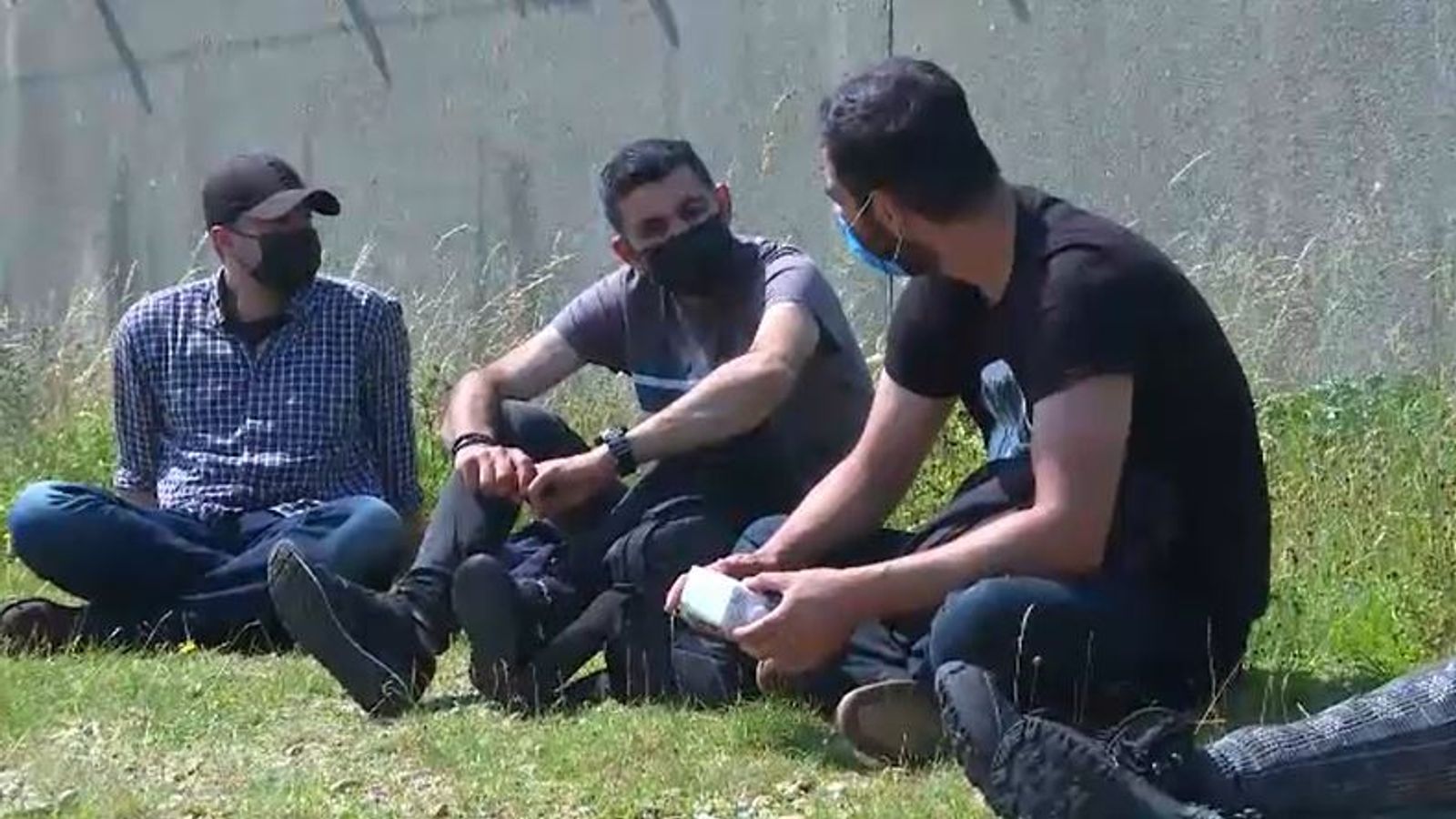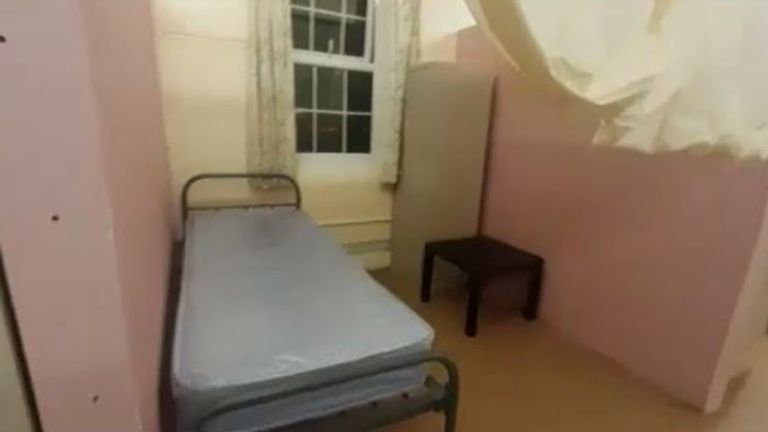A migrant charity has told Sky News of its concerns about the impact of leaving asylum seekers trapped in a “dysfunctional” claims system for months and years on end whilst their applications are processed.
Care4Calais says government policies which place some in the asylum process in large accommodation centres such as hotels are also making them easy targets for abuse by far-right groups.
Latest figures show the Home Office is currently dealing with 109,000 asylum claims – which involves those awaiting a first decision; those involved in the appeals process and those who are fighting deportation.
A single claim can also involve multiple family members.
But over the last decade the number of asylum seekers waiting more than six months for an initial decision on their application has gone up tenfold.
Asylum seekers are not allowed to work but they are given basic support such as food and somewhere to stay until a decision is made.
But there’s a more sinister side to the impact of the delays. The far-right group Britain First posted videos as recently as August of this year of protests they’ve staged at accommodation housing asylum seekers around the country.
Clare Moseley, founder of Care4Calais, said: “They (Britain First) go to the accommodation and verbally harass the asylum seekers and make them scared to go outside. When you’re in a foreign country you don’t have a lot of rights and you’re really scared and intimidated. It makes the asylum seekers feel imprisoned and that’s really horrible. It’s really easy for them (Britain First) to take advantage. They bang on the hotel doors and in some cases they’ve got inside and shouted at the asylum seekers. It’s disgusting behaviour.”
The Home Office disperses migrants all over the country to wait for a decision on their applications. They can end up in a variety of accommodation including shared housing, hotels, and repurposed empty buildings.
Concerns have been raised about the use of a former army barracks in Kent which campaigners say migrants who’ve fled from conflict and authoritarian regimes find psychologically difficult.
Ms Moseley, who says she’s received hate mail herself for providing aid to migrants, said: “The way to solve the problem is to process people’s claims so they can be contributing to society. It’s costing us money and asylum seekers are getting blamed for it. It doesn’t make any sense does it. The objective should be to work out who really needs asylum and make sure they get it and those who don’t don’t get it. The system is dysfunctional.”
Sky News visited two different cities in the north of England to speak to asylum seekers in Home Office accommodation.
Outside a hotel we met 32-year-old Kurdish Iraqi Hooshang Amin who paid smugglers to get him to the UK by small boat from France at the end of March this year.
He speaks five languages but the former journalist says other migrants who can’t speak English get “lost” in the system and come knocking on his door asking for help.
He said: “Most of them, they need help. They can’t speak English… it’s a big problem for the refugees,” adding that they need practical help and support with communicating with GPs, the NHS and the Home Office.
Near the hotel we met a local man called Peter, out with his two children. He told us he thought the migrants should be sent back to their countries of origin.
He said: “I’m just thinking for my kids’ safety when you see them walking round her in the park, and I don’t know who they are and where they’re from.”
He admits there’s no evidence of any wrongdoing by the asylum seekers living near him but he says “that’s just my opinion”.
In another city we met an asylum seeker who gave his name as Bahzad and said he was from Iran. He’d come to visit his friend who he’d crossed the channel with illegally in a small boat nine months ago but they’d been sent to different places by the Home Office.
He told us: “I live in Runcorn. I come to visit my friend because I’m alone. I have no family.”
Stepping foot on UK soil is a moment of jubilation for many asylum seekers after the dangers of crossing the Channel.
But many tell us they never dreamt the asylum system would be so drawn out and difficult to navigate.
An Iranian asylum seeker who Sky News first met after he crossed the channel illegally with a friend is still fighting for the right to stay in the UK nearly two years after arriving.
He’s too afraid to reveal his name because of fears for the safety of his family back home.
He’s been moved to multiple accommodation locations in at least four different towns and cities and also threatened with deportation.
He told me he loves the UK as a country, but added: “I have a very bad life at the moment. It’s stressful and it feels like I’m in prison.”
Where to house asylum seekers is a minefield.
But the melting pot of relations with local communities and the impact on the asylum seekers themselves is being exacerbated by the lengthy delays in the processing system.
Peter Walsh, researcher in migration at Oxford University’s Migration Observatory, said the backlog in the number of asylum applications is bigger than it’s ever been before.
He said: “There are a number of factors including an increase in the number of applications over the past five years, changes in administrative policy and management, and also the end of a scheme the government operated to fast track asylum applications.
“We know also that the investments in the Home Office and in the division where the caseworkers work that process these cases, the investment has shrunk as well. Some would also say that the complexity of the cases is increasing.”
The Home Office says it takes the wellbeing of asylum seekers and the communities in which they live extremely seriously and that efforts to fuel resentment towards asylum seekers and create community tension are completely unacceptable.
A spokesperson said: “We are working to streamline cases and have already made significant progress in prioritising the vulnerable, but we are determined to clear the backlog and speed up decisions.
“Our New Plan for Immigration will overhaul of broken asylum system, so we can crack down on those abusing our system and better protect and support those in genuine need of asylum.”






